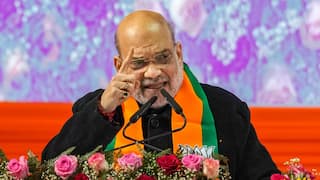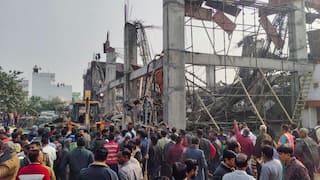Chinese Christians facing religious persecution

Hong Kong [China]/Washington [United States], April 27 (ANI): Authorities in China are cracking down on Christians, taking steps ranging from demolition of churches, desecration of tombs, forbidding children from entering churches, threatening Catholics and denying government subsidies and pensions to church believers.
Recent repression efforts have targetted both house and state-sanctioned churches through the harassment and detention of Christian believers, blocking entry to sites of worship, interrupting gatherings, dismantling crosses, demolishing churches, or disbanding congregations.
According to a report published in asianews.it website, acts of persecution and violation of Christian edifices have been frequently reported from the central Chinese province of Henan.
One report revealed that the tomb and plaque of a former bishop of Luoyang, Li Hongye, in central China, was desecrated and destroyed. The tomb was targeted because it had signs of his Episcopal office, claim Christian believers.
A church in the village of Hutuo has also been destroyed recently.
On April 1, in Zhengzhou, during a Easter Sunday mass, government representatives entered the church and removed children and young under the age of 18 on grounds that religious education to minors is prohibited.
There is a view gaining ground that these acts of persecution and prohibition are in fact a promotion of new government regulations on religious activities that have come into effect from February this year.
In its report, asianews.it says that the application of these regulations "is a litmus test to see if resistance is posed, and to study how to suffocate it. Later the regulations will be applied throughout the country, even in places where Catholics are a good percentage of the population, as in Hebei or Shanxi."
Beijing, it claims, is taking action against both official and underground communities to prevent conversions to Christianity and the emergence of powerful religious renaissance in the country.
At the Shangqiu Diocese in Henan, Catholic elders have been categorically told that if they encourage anybody in their community who is below 18 to convert to Christianity, their children with not be allowed to go to school and they will lose 60 Yuan as government subsidy.
A Council for Foreign Relations (CFR) report published in March this year said, "China has witnessed a religious revival over the past four decades, in particular with a significant increase in Christian believers. The number of Chinese Protestants has grown by an average of 10 percent annually since 1979. By some estimates, China is on track to have the world's largest population of Christians by 2030."
Article 36 of the Chinese constitution protects freedom of religion. Yet that protection is limited to so-called "normal religious activities," explicitly stating that "no one may make use of religion to engage in activities that disrupt public order, impair the health of citizens or interfere with the education system of the state."
"Christians have faced growing repression in recent years. Over the past twenty-five years, China ranked tenth as a country where it is most difficult and dangerous to practice Christianity," according to Open Doors, a U.S.-based Christian non-profit that tracks the persecution of Christians worldwide.
It further stated that repression campaigns in China ebb and flow. While traditionally house and underground churches faced the brunt of persecution, under President Xi Jinping's leadership, state-sanctioned churches have been targeted as well.
According to the CFR report, the Communist Party of China (CCP) identifies religious groups as potential threats to national security, social harmony and core interests and religion in China remains inherently political. (ANI with inputs)
This story has not been edited. It has been published as provided by ANI
Trending News
Top Headlines






























